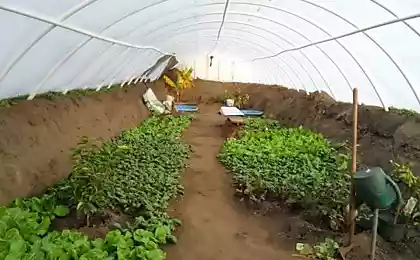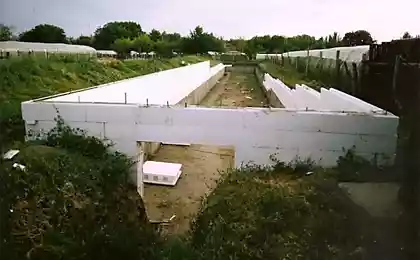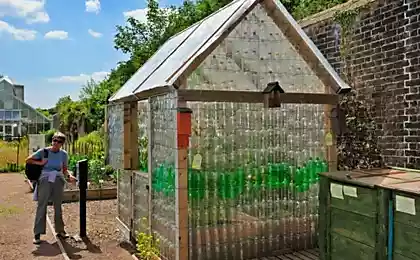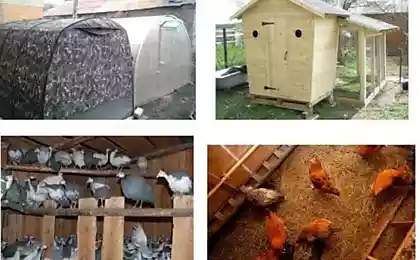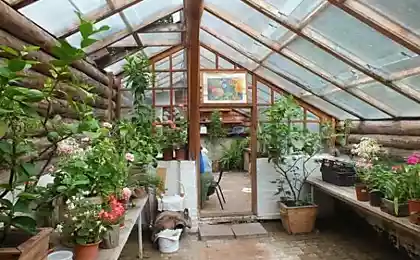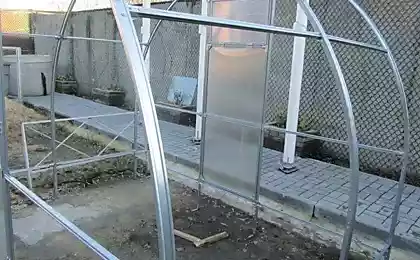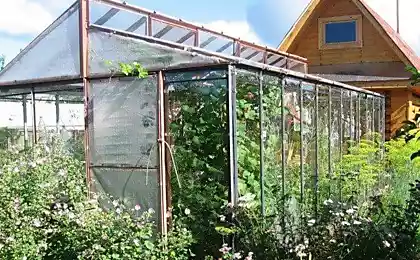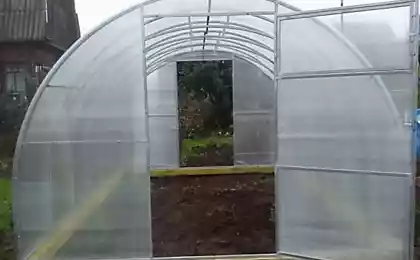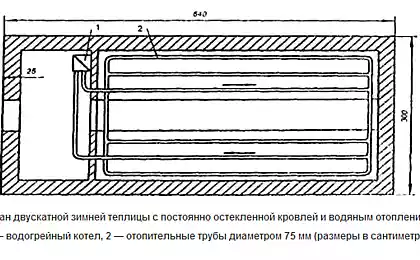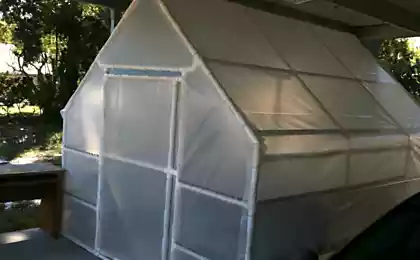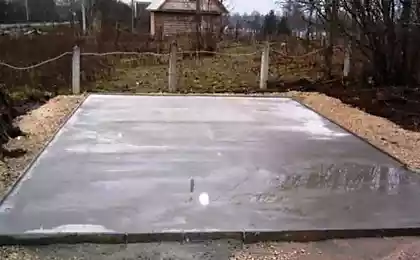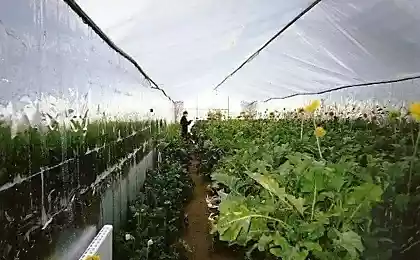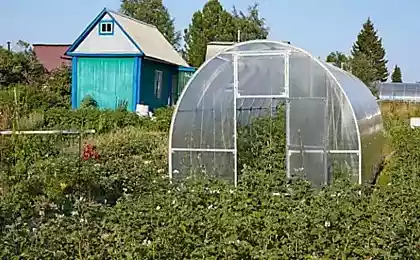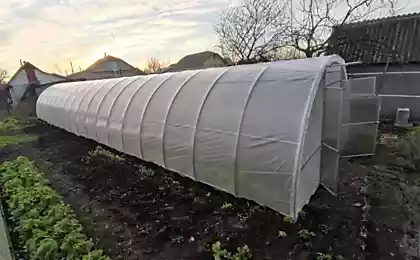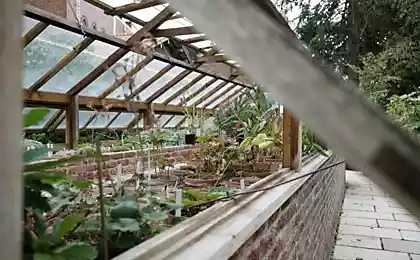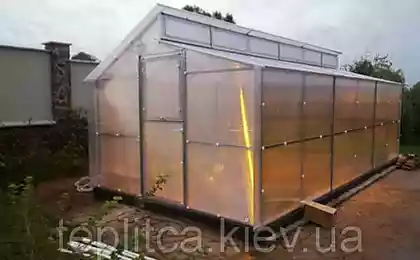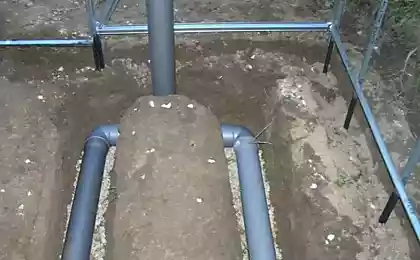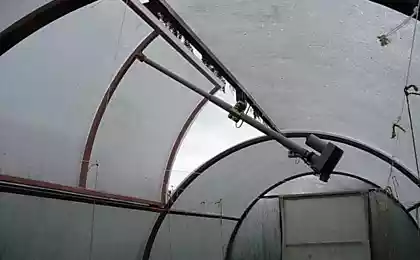559
Fancy greenhouses with high energy efficiency
What is the greenhouse, they know everything. Such structures are used almost everywhere: in the North, where the need to meet to grow crops in the shortest possible time, and in the South, where thanks to greenhouses, you can grow plants almost year round. But the well-known conventional greenhouses have a number of disadvantages.
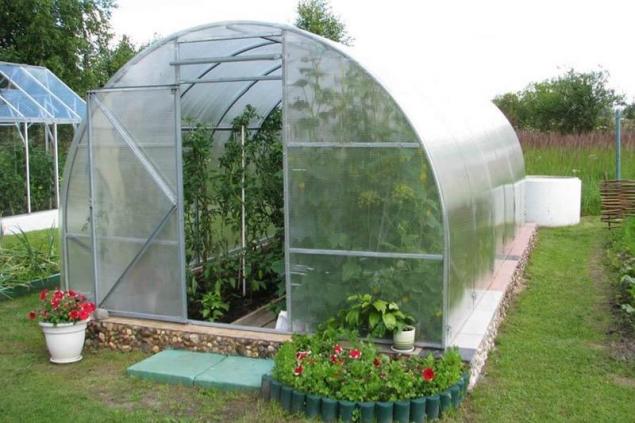
First, in the spring, winter and autumn they do not absorb sunlight in the morning and evening the sun is low, and is only used 25-30% of the energy. Secondly, through its coverage, the greenhouse loses a lot of heat, and the result is a large jump between day and night temperature, and it harms plants. And, thirdly, the traditional system of ventilation of a greenhouse through doors or Windows is having a negative impact, as he goes out the moisture, carbon dioxide and nitrogen, which plants need, so you have more of them to water and fertilize.
But with all these disadvantages can handle some unusual greenhouses.
Vegetari IvanovaThis design allows to solve all the problems that accompany conventional greenhouses. Obligatory is the location on a slope of 15-20 degrees. With three walls and a flat roof made from polycarbonate, and one wall should be thorough and glued a mirror surface to reflect rays. Such a construction increases the penetration of sunlight, and the lower the sun is, the more efficient is the absorption of energy.
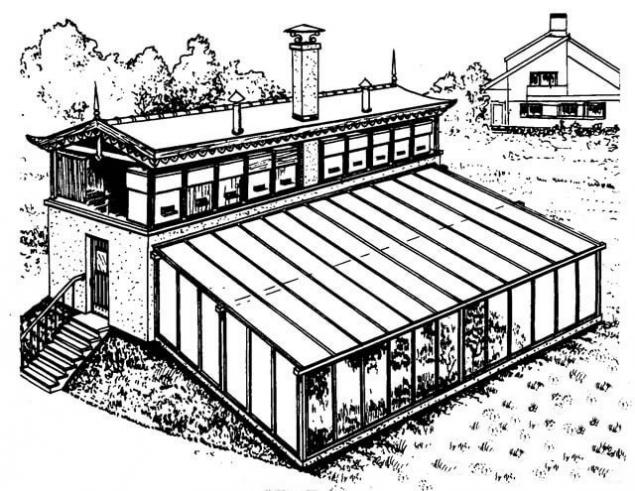
Quite interesting and the system of air and heat exchange in the greenhouse. So, thanks to the existence of a system of tubes under the greenhouse, the fan and the pair of dampers, a day even in winter the temperature can reach 33 degrees, and the pipes it is pumped into the ground, warming it to the optimal performance, while at night the soil as a heat accumulator heats the air. However, even in the winter you can do without a heater, but for the coldest days still sometimes can use the normal heater.
The heat exchange system works the same in summer, only there has passed the cool, in the end, the soil and the plants do not overheat. Such a principle is good because it retains the moisture and carbon dioxide. In the process the soil is still moisturized and the condensate obtained in the cooling air. Such a system can be called perfect, it allows you to save 60 to 80 times more energy than normal, and if the temperature is above -10 degrees, that you can do without a heater.
Trench greenhouses Vladimir AntropovOn the very name is easy to guess that will have to deal with something a little dent in the ground. So, these greenhouses equip at a depth of 1.5 m or more – depending on what level ground water table. Wall spread brick, and the beds formed at a sufficient height and also made of brick. All this is done so that in the daytime the heat was accumulated, and in the night was given to the plants.
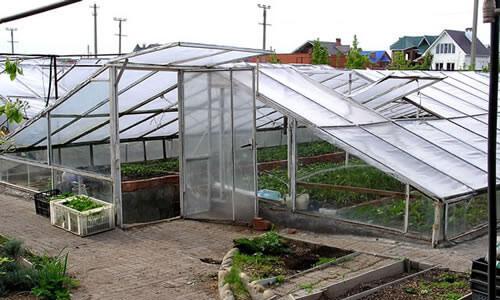
The top of the greenhouse is quite standard – it is a plastic pipe bent into an arc, and covered the top with plastic wrap. And as the vents are doors which are situated on the sides of the greenhouses are actually under her roof. While the cold air smoothly flows down and has no negative impact on plants, since they are placed under the ridge of the greenhouse, where warm air accumulates.
Design features here allow you to minimize heat loss, and the received – save for a longer period, because of the brick walls and the beds heat up very quickly and actively accumulate heat. Warming contributes to the fact that in winter, deep balls of soil, and so is able to give off heat, and due to the fact that the area of the overground part is small and decreases the influence of winds, which are not able to "blow" the heat. In the end we get a great result in winter in a greenhouse of this type is much warmer at 12 degrees, than usual. Mind you, what about heating it never was – it's not required, but if some nights will be particularly cold, the beds can be covered with fabric material.
Besides, differences of temperatures in such a greenhouse will not affect the harvest, as structural features allow much heat to enter, creating the optimum conditions in the winter, but in summer, the air practically does not overheat.
Ecotalitythe basis of ecotality based on the principle of interaction of all organisms in the ecosystem, then it will be in a state of harmony. The design is as follows: the greenhouse is elongated from East to West, its Northern wall is covered with white plastic to reflect the rays, the roof is flat, slightly inclined to the South and as leakproof as possible, and the walls are made of fiberglass. In General the tightness is there is paid maximum attention.
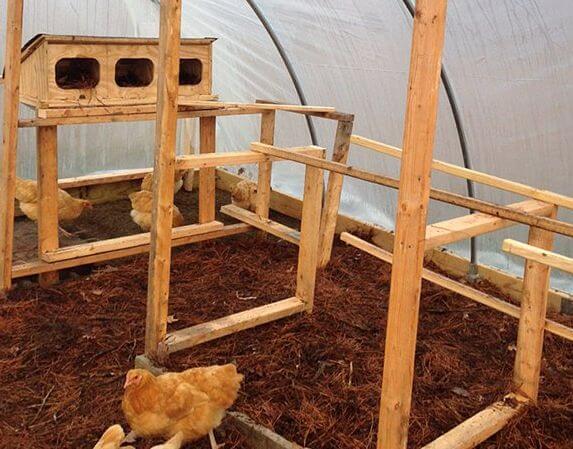
The main feature is that on the sides of the greenhouse are areas for the breeding of animals such as rabbits and chickens. From menageries into the greenhouse to pass the pipes with holes, through which come the small amounts of nitrogen, carbon dioxide and moisture and heat. In result, the plants get the missing elements, and the animals have cleared the air.
The composition of the soil also has some special features: it includes loam, sand and compost which is made from animal droppings. Also available through proper drip irrigation, and all residues from plants are fed to animals. The cycle is closed. While emphasizing that animals are a great source of heat, for example, rabbit, for one year to give as much energy as is obtained from burning of 10 liters of oil.
Another heat carrier is water, in the greenhouses there are several large tanks and their contents is heated using solar energy. So, under the roof there is a fan that is powered by solar panels, and when it's warm it turns on and heats the water tank that day off from plants. At night the so-called radiators give the accumulated heat.
Water tanks also help to balance temperature and in the days of summer heat. In General, the ventilation in a greenhouse is rarely used, as the design allows hot air to quickly leave the room.
Solar greenhousesConstruction of greenhouses, is very similar to vegetari Ivanov: there is also one main wall with a reflective coating, and the remaining walls are made of polycarbonate or use double glazing. The interest here is causing quite a battery of warmth: so in the middle of the greenhouse, dig a hole, the size of which depends on the dimensions of the room, it is filled with granite or broken bricks. In the pit must also be provided with canals that will come out with plastic pipes, in which is mounted a fan. In the result, the heated night air is blown into the room of the greenhouse.
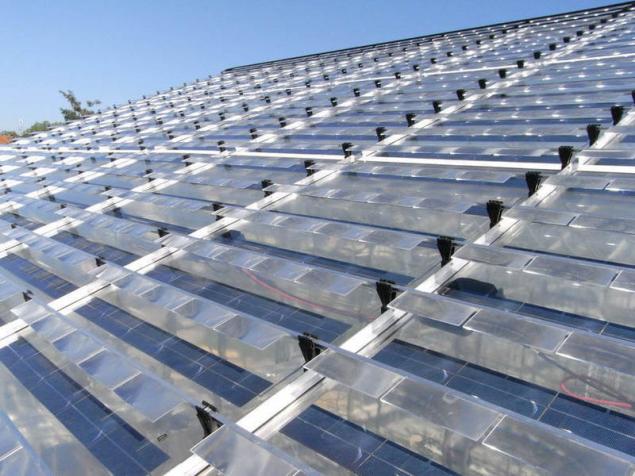
Thus, it is seen that for sufficiently simple structures can obtain significant energy savings, which will affect the cost of production. As a result, you can open your quite a profitable business. published
P. S. And remember, only by changing their consumption — together we change the world! ©
Join us in Facebook , Vkontakte, Odnoklassniki
Source: moscowsad.ru/energoeffektivnye-teplicy.html

First, in the spring, winter and autumn they do not absorb sunlight in the morning and evening the sun is low, and is only used 25-30% of the energy. Secondly, through its coverage, the greenhouse loses a lot of heat, and the result is a large jump between day and night temperature, and it harms plants. And, thirdly, the traditional system of ventilation of a greenhouse through doors or Windows is having a negative impact, as he goes out the moisture, carbon dioxide and nitrogen, which plants need, so you have more of them to water and fertilize.
But with all these disadvantages can handle some unusual greenhouses.
Vegetari IvanovaThis design allows to solve all the problems that accompany conventional greenhouses. Obligatory is the location on a slope of 15-20 degrees. With three walls and a flat roof made from polycarbonate, and one wall should be thorough and glued a mirror surface to reflect rays. Such a construction increases the penetration of sunlight, and the lower the sun is, the more efficient is the absorption of energy.

Quite interesting and the system of air and heat exchange in the greenhouse. So, thanks to the existence of a system of tubes under the greenhouse, the fan and the pair of dampers, a day even in winter the temperature can reach 33 degrees, and the pipes it is pumped into the ground, warming it to the optimal performance, while at night the soil as a heat accumulator heats the air. However, even in the winter you can do without a heater, but for the coldest days still sometimes can use the normal heater.
The heat exchange system works the same in summer, only there has passed the cool, in the end, the soil and the plants do not overheat. Such a principle is good because it retains the moisture and carbon dioxide. In the process the soil is still moisturized and the condensate obtained in the cooling air. Such a system can be called perfect, it allows you to save 60 to 80 times more energy than normal, and if the temperature is above -10 degrees, that you can do without a heater.
Trench greenhouses Vladimir AntropovOn the very name is easy to guess that will have to deal with something a little dent in the ground. So, these greenhouses equip at a depth of 1.5 m or more – depending on what level ground water table. Wall spread brick, and the beds formed at a sufficient height and also made of brick. All this is done so that in the daytime the heat was accumulated, and in the night was given to the plants.

The top of the greenhouse is quite standard – it is a plastic pipe bent into an arc, and covered the top with plastic wrap. And as the vents are doors which are situated on the sides of the greenhouses are actually under her roof. While the cold air smoothly flows down and has no negative impact on plants, since they are placed under the ridge of the greenhouse, where warm air accumulates.
Design features here allow you to minimize heat loss, and the received – save for a longer period, because of the brick walls and the beds heat up very quickly and actively accumulate heat. Warming contributes to the fact that in winter, deep balls of soil, and so is able to give off heat, and due to the fact that the area of the overground part is small and decreases the influence of winds, which are not able to "blow" the heat. In the end we get a great result in winter in a greenhouse of this type is much warmer at 12 degrees, than usual. Mind you, what about heating it never was – it's not required, but if some nights will be particularly cold, the beds can be covered with fabric material.
Besides, differences of temperatures in such a greenhouse will not affect the harvest, as structural features allow much heat to enter, creating the optimum conditions in the winter, but in summer, the air practically does not overheat.
Ecotalitythe basis of ecotality based on the principle of interaction of all organisms in the ecosystem, then it will be in a state of harmony. The design is as follows: the greenhouse is elongated from East to West, its Northern wall is covered with white plastic to reflect the rays, the roof is flat, slightly inclined to the South and as leakproof as possible, and the walls are made of fiberglass. In General the tightness is there is paid maximum attention.

The main feature is that on the sides of the greenhouse are areas for the breeding of animals such as rabbits and chickens. From menageries into the greenhouse to pass the pipes with holes, through which come the small amounts of nitrogen, carbon dioxide and moisture and heat. In result, the plants get the missing elements, and the animals have cleared the air.
The composition of the soil also has some special features: it includes loam, sand and compost which is made from animal droppings. Also available through proper drip irrigation, and all residues from plants are fed to animals. The cycle is closed. While emphasizing that animals are a great source of heat, for example, rabbit, for one year to give as much energy as is obtained from burning of 10 liters of oil.
Another heat carrier is water, in the greenhouses there are several large tanks and their contents is heated using solar energy. So, under the roof there is a fan that is powered by solar panels, and when it's warm it turns on and heats the water tank that day off from plants. At night the so-called radiators give the accumulated heat.
Water tanks also help to balance temperature and in the days of summer heat. In General, the ventilation in a greenhouse is rarely used, as the design allows hot air to quickly leave the room.
Solar greenhousesConstruction of greenhouses, is very similar to vegetari Ivanov: there is also one main wall with a reflective coating, and the remaining walls are made of polycarbonate or use double glazing. The interest here is causing quite a battery of warmth: so in the middle of the greenhouse, dig a hole, the size of which depends on the dimensions of the room, it is filled with granite or broken bricks. In the pit must also be provided with canals that will come out with plastic pipes, in which is mounted a fan. In the result, the heated night air is blown into the room of the greenhouse.

Thus, it is seen that for sufficiently simple structures can obtain significant energy savings, which will affect the cost of production. As a result, you can open your quite a profitable business. published
P. S. And remember, only by changing their consumption — together we change the world! ©
Join us in Facebook , Vkontakte, Odnoklassniki
Source: moscowsad.ru/energoeffektivnye-teplicy.html
